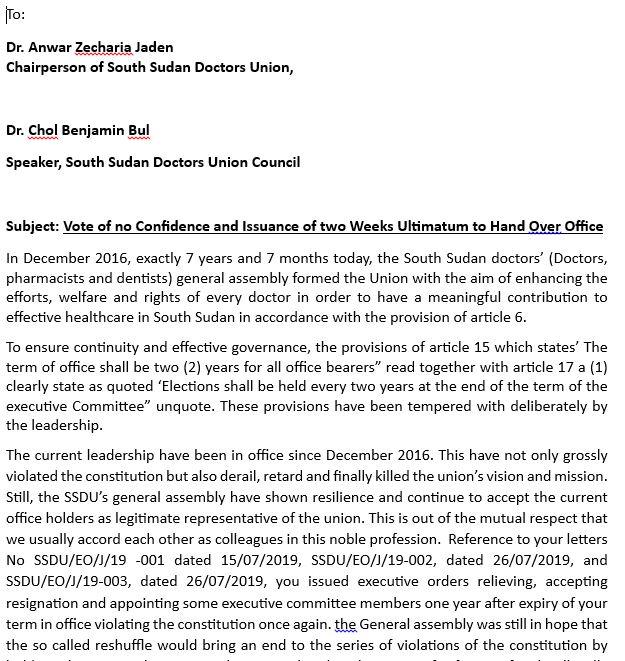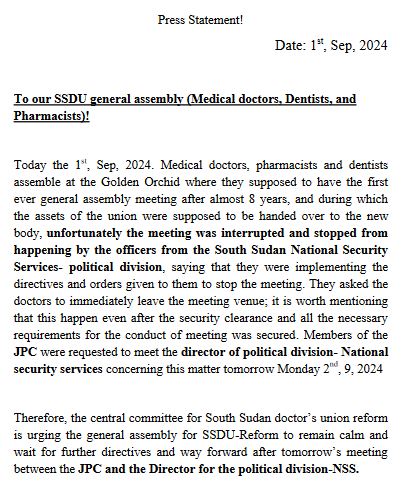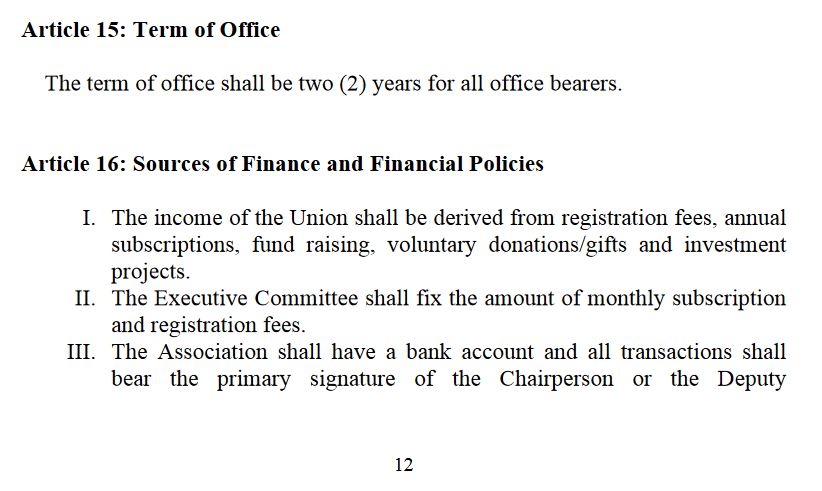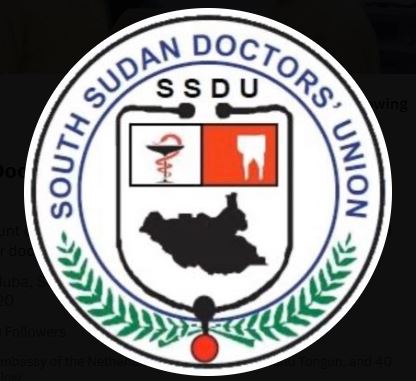The executive body of the South Sudan Doctors’ Union has refused to organize elections in over seven years or vacate office yet the body’s constitution stipulates the term of office is two years.
Last Sunday, 31 August, officers from the National Security Service’s (NSS) Internal Security Bureau (ISB) canceled the General Assembly of medical professionals at the Golden Orchid in Juba. The assembly, the first in nearly eight years, aimed to transfer the union’s assets to a new interim governing body and tackle critical issues faced by medical practitioners.
Now, a doctor and member of the union who requested to speak to Radio Tamazuj on condition of anonymity for his safety and fear of reprisals said the NSS has been threatening, intimidating, and silencing members of the union against talking about the issues of the group’s administration.
“It is true that last Sunday the NSS disrupted and dispersed our General Assembly meeting of the South Sudan Doctors Union. We were meant to be given a report by the executive body of the union which has overstayed its mandate in office and we planned to elect a new executive body,” he explained. “The current executive was elected in 2016 and their term ended a long time ago and they have now been in office for over six years. They have abrogated the union’s constitution and are now illegally in office using political force from the ministry, have become more of a political body, and have been involved in corruption and other activities to benefit themselves.”
The medic added: “As members of the General Assembly of the Doctor’s Union, we came out severally with resolutions that the executive whose tenure in office has ended should call the General Assembly and hand over office to an interim body or new people.”
According to the doctor, the executive refused to vacate the office and said they could not call a General Assembly meeting for purposes they did not understand.

“One of the biggest issues with the current expired executive is that some of them are members of the NSS, like the secretary general and president of the union who are doctors but double as intelligence officers. So, they use their powers to frustrate and intimidate members of the union from asking for accountability and demanding fresh elections for reasons they know,” he stated. “As members of the union, we formed a committee called the South Sudan Doctors’ Union-Reform on 27 July, declared a vote of no confidence in the executive, and shared the resolutions with our members in Juba, across the country, and abroad. We did the vote of no confidence online and over 400 of our members from all over signed it. We then sent the vote of no confidence to all the relevant offices including the health ministry, the Medical Council, and the NSS among others.”
“We also sent it to the executive and told them that as members, we do not want your leadership anymore and that we want to form a steering committee to which they will hand over the assets, constitution, stamps, and other items so that new elections can be conducted,” the further medic explained.
He said the members of the executive refused and said they would hand over office “when and how they want.”
He then states that as a committee, they gave the executive body two weeks to hand over the office after which the committee would institute legal procedures against them and form a parallel union.
“Some of our members and opinion leaders approached our committee and the executive body and said it would not be right for doctors to be involved in such a scandal that would divide us and tarnish our image when it is picked up by the media,” he said. “They advised that we form one committee to oversee the handover of the office peacefully. So, we formed what we named the Joint Preparatory Committee to register the members and call a General Assembly on 31 August and to mobilize for elections. The joint committee worked well and registered over 220 doctors.”
“There was a disagreement about who would chair the meeting of 31 August between the executive whose term has expired and the Joint Preparatory Committee because the expired executive has no mandate or right to generate the agenda and or chair the General Assembly yet they wanted to do so by force,” he clarified.

The medic said that the first agenda of the executive body whose term in office ended long ago was to amend the constitution of the union and yet the constitution stipulates that the term of office of the executive is two years and the current executive has been in office for over seven years.
“So, we said they do not have a right to change the constitution. We told them to just come and present their report to the General Assembly on the day of the meeting after which an electoral body would be formed to conduct elections for new office bearers. They refused and insisted that they lead the meeting of 31 August instead of the Joint Preparatory Committee, that they change the constitution, and that there be no mention of dissolving the old executive. As members of the General Assembly, we refused their proposal and said we are the ones to come up with an agenda and not them whose term of office has expired,” he enlightened. “So, this was our point of contention with the former executive body which has refused to hand over office because they have relations with the National Security Service (NSS) and other intelligence outfits. So they went to the NSS and said that there were members of the doctors’ union who were opposed to the government, were rebels, and wanted to take control of the union’s executive to radicalize doctors so that they could demonstrate against the establishment, down their tools and make the government look bad.”
The doctor added” “Basically, they came up with false and serious accusations against the committee and the General Assembly that led to the NSS, who had approved the meeting of the General Assembly of 31 August, canceling it on that day.”

He said they found NSS officers at the venue who told them there was going to be no meeting and everyone who did not follow their directives would face tough consequences.
“When we investigated who was behind the NSS stopping the meeting, we discovered it was the old executive body whose term has since expired,” the medic stated. “We are coordinating and working to brief the leadership of the National Security and other relevant authorities about the real problems and issues affecting the union. We will keep Radio Tamazuj informed in case of any developments.”
Efforts to reach the union’s executive body, the NSS, and health ministry officials for comment were futile.
The NSS has permeated almost all spheres of life in South Sudan and has often interfered in the affairs and elections of professional bodies, community associations, and other bodies in the country.




